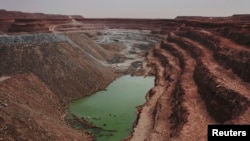The West African nation of Niger and China have been discussing deals that include an industrial park, an oil pipeline and a uranium mine.
The Chinese ambassador to Niger, Jiang Feng, said China would build an industrial park that would impact industries including agro-food, manufacturing, mining and real estate, according to a tweet from Nigerien President Mohamed Bazoum's official account. It said the deal is a result of a China-Niger Investment Forum held in April.
"China does what it says and says what it does," said Jiang.
The tweet also mentioned that the Chinese ambassador recently visited the starting point of the Niger-Benin Export Pipeline and described it as "very impressive." With the China National Petroleum Corporation as the developer, the nearly 2,000-kilometer-long pipeline would allow landlocked Niger to ramp up its crude production and access international trade by way of a terminal on Benin's coast, officials say.
Days before comments on these deals, a delegation from the National Uranium Company of China, or CNUC, discussed the resumption of exploration and mining of uranium in Niger's northern regions nine years after the project was abandoned because of poor sales of the commodity in international markets.
"Prices [of uranium] are now favorable internationally. It is for us to better develop this sector with all the partners, including the CNUC, who already have operating permits," said Ousseini Hadizatou Yacouba, Niger's Minister of Mines.
Yacouba and Xing Yongguo, CNUC's president, signed a new deal in Niamey on June 27 to resuscitate activities at the uranium site in Arlit in the Agadez region, located in northern Niger.
Ahmed Mousa, the mayor of Ingall, a town in the Agadez region, the district where the main uranium project is taking place, is happy that work is resuming, saying it will provide electricity and other infrastructure for local communities.
"It is great that they are back at work. We have been waiting for them to return. This will generate jobs for our people. It will help the economy," Mousa said.
The project is part of an ongoing effort by Beijing to invest in African countries. China is Africa's largest trading partner with two-way trade totaling over $200 billion per year. More than 10,000 Chinese firms have forged partnerships across the continent since 2005, with an estimated $300 billion investment in projects, according to a report by the U.S. House Foreign Affairs Committee.
Some civic groups in Niger oppose the plan, warning that mining poses environmental dangers.
Iliyasou Aboubakar, a member of ROTAB, a nongovernmental organization that goes by its French acronym, said African countries, including Niger, must not allow China to have free rein around their natural resources. The advocacy group focuses on policy, transparency and other rights in the mining industry in Niger.
"This project has the potential to adversely affect humans, animals and plants. Authorities must make sure measures are taken to safeguard the health of the environment. This project should be stopped from moving forward," Aboubakar said.
Niger has two major uranium mines that provide about 5% of the world's highest-grade uranium ore, according to the World Nuclear Association. In 1971, the country's first commercial uranium mine began operations. In 2021, Niger produced more than 2,248 tons of uranium.
VOA's Salem Solomon contributed to this report.





